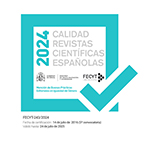Apropiaciones de las TIC para la socialización por parte de personas con discapacidad auditiva. Un estudio de caso: Zaragoza.
Resumen
El acceso a las tecnologías de la información y la comunicación (TIC) es una cuestión relevante en las sociedades contemporáneas, especialmente en colectivos vulnerables. A partir de un estudio de caso de las personas con discapacidad auditiva residentes en Zaragoza, se analizan sus apropiaciones de las TIC como recurso para la socialización, así como los sentidos y valoraciones sobre las mismas. En general, los miembros de este colectivo reconocen la utilidad e importancia de las TIC para informarse, comunicarse y socializar, pero se observan diferencias en su apropiación entre las personas signantes y no signantes. Se identifican tendencias como el incremento del uso de los teléfonos inteligentes en sustitución de los ordenadores o la valoración de ciertos riesgos o peligros asociados a las TIC. El dominio en la utilización de las TIC se halla condicionado por variables tales como el conocimiento, o no, de la lengua de signos; la edad y la condición de nativo o no nativo digital.Descargas
Descarga artículo
Licencia
La revista Cuadernos de Trabajo Social, para fomentar el intercambio global del conocimiento, facilita el acceso sin restricciones a sus contenidos desde el momento de su publicación en la presente edición electrónica, y por eso es una revista de acceso abierto. Los originales publicados en esta revista son propiedad de la Universidad Complutense de Madrid y es obligatorio citar su procedencia en cualquier reproducción total o parcial. Todos los contenidos se distribuyen bajo una licencia de uso y distribución Creative Commons Reconocimiento 4.0 (CC BY 4.0). Esta circunstancia ha de hacerse constar expresamente de esta forma cuando sea necesario. Puede consultar la versión informativa y el texto legal de la licencia.









